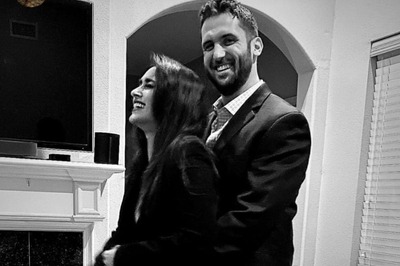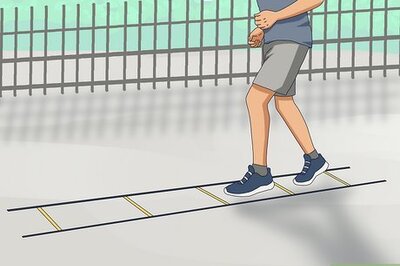
views
I was visiting my parents in my hometown Palakkad during the first week of August when the news of heavy rains in Kerala started making headlines across the Malayalam media. My father was telling me if Idukki dam shutters were to open, things may go out of control.
I brushed it off. Unperturbed, I was enjoying the monsoon sitting in my terrace, watching the winds blow.
It was pouring intermittently, the way it usually does at this time of the year. Yet, there was something rather unusual about the rains this year, I thought. Little did I know that I will have to return from Mumbai to report on the deadliest deluge that would ravage my home state, taking away lives and rendering lakhs marooned and homeless.
I had always been detached from my home state until I saw it grappling with the worst catastrophe of our times. I was born in Kerala, studied there, lived in every important town there till the age of 18, yet never felt this deeply connected to it as I feel now. What I saw on ground shook me up and reinforced my faith in humanity. It also transformed me into a proud Keralite.
My only motivation to visit Kerala has been to meet my father - who by the way watched television by fixing a generator since power supply went kaput - all this just to help me with the coverage by feeding me all the right information and give a sense of the situation in other parts.
The first lap of my coverage was to cover Aluva and then head to Idukki where all five shutters of one of the largest dams were opened after 26 years. My colleague Manish Dubey and I set out to cover devastation and destruction on the banks of Periyar river and its catchment areas. We saw up-close the dam's water gushing into the river and the roaring intensity of the flowing water which was washing away homes, destroying farms and damaging roads.
We met Sukumaran, a daily-wage labourer who lived on the banks of the Cheruthoni river. He was in tears, staring at his flood-battered home. "My family and I have been put in a relief camp, every hour I come back and check if the water has receded. Look at my home, it's completely submerged. I'm left with nothing," he cried.
Rows of houses submerged, shops inundated and helpless citizens scurrying around for a shelter --- things were just beginning to get bad. We drove towards Munnar, a dangerously hilly stretch marred by landslides every 200 metres. We saw fallen trees, mud along with debris of houses flowing down the roads, vehicles, cars and trucks buried and crushed. The picturesque tourist spot was slowly turning into a ghost-town.
Resorts were empty and the town wore a deserted look. But the worst was yet to come. While I was reporting, a hotel staff member came to me and asked me not to scare away tourists with our coverage
"Things will get better. This is our bread and butter; so don't ruin it by giving it a bad name," he said. We left the next day when rains subsided but things only got worse after that. The rains intensified and the tourist destination was ravaged in the heavy flooding, claiming 18 deaths. Munnar was completely cut-off for 10 days. We were fortunate to leave in the nick of time.
Another heavy spell of rains and shutters of Mullaperiyar dam were opened and many more towns and villages in Kerala were flooded. Things spiralled out of control. We headed towards Pathanamthitta district which was the worst affected. We reached Pandalam --the town looked like a river. I hopped up a fire truck and went for coverage. It was mayhem; boats, fire brigade, choppers, ambulances, NDRF teams, locals coming out in large numbers - confused, exasperated, anxious but hopeful. Many of them calling out for help, reaching out to us because their kin were stranded. We were helplessly watching and reporting.
The boats were wobbly. They couldn't go to many isolated spots because of strong water current.
But in the midst of all, what stood out was the undying spirit of the people; the unity, compassion and brotherhood. It was unparalleled.
While armed forces pulled off exemplary rescue operations, braving hazardous rain and terrains, the fishermen were the real heroes.
Saju, a fisherman who was using his boats to rescue people in Chengannur was prepping up his boat to go to an inaccessible place. "The flow of water is heavy. Some of our boats got damaged. It's risky but we've got to save our brothers and sisters who are stranded." It was heartening to see fishermen and ordinary people standing up for their people selflessly in the hour of crisis.
We spotted volunteers, students, doctors, businessmen, housewives braving the bad weather to help out in every possible way. There was no fuel, electricity or mobile connectivity. Every shop, hotel and establishment had its shutters down. Yet, we were offered food by dozens of people who were aiding the rescue. Meal packs, biscuits, water were being distributed everywhere. We were never left hungry.
Sam Abraham, a resident of Adoor, had hired a private boat to transport food to marooned people. He was our go-to person from that day. We hadn’t figured where to stay. There were many relief camps that were ready provide shelter. Sam said, “My house is not affected by floods. You all can stay at my house. My mother will cook.”
But we managed to find a hotel far away, though Sam was our friendly guide throughout our trip. His house became our resting place and the only place where we could charge our phone and camera. We were unable to reach Chengannur the next day as it was cut off from all sides.
Boats, choppers, trucks were zipping their way into the worst-affected Chengannur. We were stuck at the border. Our phones had no connectivity for the whole day. We landed in a few flooded zones in Mannar and Tiruvalla. In a temple relief camp where we went to eat, we spotted a caretaker of an orphanage who saved 16 children when water raged into the orphanage. Less than a kilometre away we entered a church relief camp where we saw a man who was dealing with the death of his 26-year old son who had gone to rescue people. His wife did not know about the son’s death.
We visited over a dozen relief camps during our coverage. People everywhere were still coming to terms with their losses. A sense of gloom and despair was palpable. They would talk endlessly about their loss, what they were left with and how God played a cruel game by taking away their homes and loved ones. They would come to us for a solution.
“Will you please tell me if the government will buy us a house? What will happen to our documents? I had gold jewellery left in the house which got washed away…” There was no end to their cries for help but we never left a camp without food or water or tea.
Amidst despair, the camp inmates would ask us to rest and freshen-up. The camps were running low on medicines, baby food and clothes but help was pouring from across the world. We saw truckloads of materials being unloaded at every camp.
Water started receding slowly and people started leaving for their homes. The next day we set out to go to Pamba which is at the base of Sabarimala. But we reached a dead end on the way up the hills because of a massive landslide. The roads were laced with muck, so were homes, temples, garages and shops.
People were picking up the pieces to rebuild their homes - scrubbing, wiping and mopping – recollecting how their homes got inundated as we enter, and trying to achieve a semblance of normalcy. We made our way back to Chengannur where Sam heard the news of a 2-year-old Anavadhya who died in the floods. As we stepped into the house, her final rites were going on and she was buried in the same house where flood took away her life.
It was a heart-wrenching moment when her father told us, “She went into absolute shock when we took her in a small tub to the relief camp. She fell sick. We took her to the hospital where we were informed she had brain fever. She succumbed. She was a brave child, our happiness. We used to always say - come hell or high water, our brave girl can come out of anything.But the high water took her away. God wanted her more, I think.”
As a journalist, it was an experience in itself to cover a calamity of this scale. But I took away much more than a journalistic experience. The Kerala flood definitely taught me a lot about humanity, courage, empathy and compassion in the wake of death and destruction. There definitely was divinity amongst people in God's own country. Salute to the indomitable spirit of Kerala and its people.




















Comments
0 comment